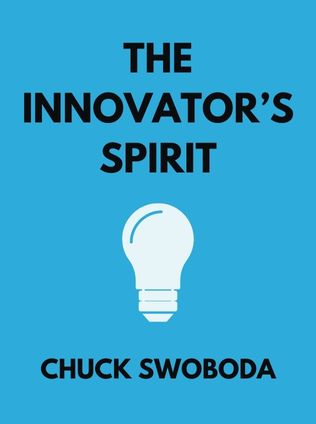
The Innovator’s Spirit
Discover the Mindset to Pursue the Impossible
By Chuck Swoboda
Published 05/2020
About the Author
Chuck Swoboda is the Innovator-in-Residence at Marquette University, President of Cape Point Advisors, and the retired Chairman and CEO of Cree, Inc. During his tenure with Cree, the company led the LED Lighting Revolution, driving the obsolescence of the Edison light bulb. Swoboda is an accomplished author, speaker, and host of the Innovators on Tap podcast, with over thirty years of experience in the technology business.
Main Idea
"The Innovator's Spirit" by Chuck Swoboda delves into the mindset required to pursue seemingly impossible challenges. Swoboda emphasizes that innovation is not a process that can be taught but a deeply personal attitude and energy. He believes that everyone has an innovative spirit within them, often buried under learned behaviors from education and professional environments. By cultivating this spirit, individuals can unlock their potential to solve problems creatively and lead their organizations to success.
Table of Contents
- Introduction
- Everyone Has an Innovative Spirit… But Not Everyone Uses It
- To be Innovative, Change Your Core Behaviors
- Embrace Change Rather than Predictability
- Finding Problems to Solve is Key
- If Someone Says You Can’t, Do It
- Failure is a Tool. Use It!
- Don’t Let Yourself Retreat
- The More You Learn, The More You Innovate
- Managers Need to Lead Rather than Manage
- Don’t Be Afraid to Get Your Hands Dirty
- The “Best Practice” is Not Good Enough
- The Innovative Spirit Awaits if You Can Find it
Everyone Has an Innovative Spirit… But Not Everyone Uses It
Swoboda posits that each person has an inherent innovative spirit. However, this spirit is often suppressed by learned behaviors from school and work, which prioritize predictable results and risk aversion. To harness this spirit, individuals must look inward and be willing to take risks. Innovation is deeply personal, stemming from unique experiences and the courage to embrace failure.
"Innovation is somewhat more like a trait than it is a learned skill. The good news is that everyone has this trait. Future innovators just need to be willing to chase it and cultivate it." - Chuck Swoboda
Recognizing that every individual has an innovative spirit is both empowering and daunting. It means that anyone can tap into their creative potential, but it also highlights the challenges of unlearning restrictive behaviors ingrained through years of traditional education and professional conditioning. The first step in this journey is to acknowledge the presence of this spirit and the necessity of nurturing it.
To be Innovative, Change Your Core Behaviors
Innovators must change core behaviors that inhibit creativity, such as risk avoidance, predictability, and the tendency to make the safest choice. Swoboda suggests "un-training" oneself from behaviors learned in school and previous workplaces. This involves embracing smart risk-taking and being open to new ideas from any source.
- Avoid risk avoidance.
- Embrace unpredictability.
- Make bold choices.
"One of the key things that future entrepreneurs and innovators need to understand is that innovation is a deeply personal thing, rather than a process you can teach through rote memorization." - Chuck Swoboda
Changing core behaviors is easier said than done. It requires a conscious effort to identify and alter habits that have been reinforced over time. For instance, risk avoidance often stems from a fear of failure, which is a natural human response. To innovate, one must embrace the possibility of failure as a learning opportunity rather than a setback. Similarly, predictability may provide comfort, but it also stifles creativity. By stepping out of one's comfort zone and embracing unpredictability, new and innovative ideas can emerge.
Embrace Change Rather than Predictability
Experience can sometimes block innovation as individuals double down on their strengths, avoiding new skills and experiences. Swoboda argues that continuous improvement through diverse experiences is crucial for innovation. Big breakthroughs often come from discontinuous ideas, which are more likely to arise when individuals draw from a wide range of experiences.
Sign up for FREE and get access to 1,400+ books summaries.
You May Also Like
The Subtle Art of Not Giving a F*ck
A Counterintuitive Approach to Living a Good Life
By Mark MansonRich Dad Poor Dad
What the Rich Teach Their Kids About Money - That the Poor and Middle Class Do Not!
By Robert T. KiyosakiHow To Win Friends and Influence People
The All-Time Classic Manual Of People Skills
By Dale CarnegieQuiet: The Power of Introverts
The Power of Introverts in a World That Can't Stop Talking
By Susan Cain



















